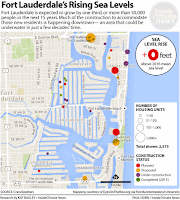The Venice of America is expecting its population to grow by a third, but it already can't handle the impacts of climate change.
Along the canals that slice through downtown Fort Lauderdale, dozens of freshly razed lots sit ready for construction, many nestled next to historic riverfront mansions and yachts bobbing dockside. Cranes and half-built high-rises tower overhead. Everywhere, there are signs that this mid-size city of 170,000 is thinking big.
Mayor Jack Seiler says the goal is to turn Fort Lauderdale into “the city you never want to leave.” The population is expected to grow by a third, more than 50,000 people, in the next 15 years. Nearly 5,500 apartments and condos are, or will soon be, under construction and developers are seeking to build another 2,400 units in the next few years. The city processed 26,000 building permits with a construction value of $1.8 billion last year alone.
But as the coastal city's skyline climbs upward, Fort Lauderdale—nicknamed the Venice of America for its 165 miles of canals—is slowly becoming an edifice of risk as climate change lays siege to its shores.
Already, water regularly creeps over sea walls, lapping against foundations every few weeks. When the earth, moon and sun align to drive waters as much as 18 inches above normal, the resulting King Tides inundate whole streets and neighborhoods. The city is racing to put climate resiliency measures in place, but they face a nearly impossible foe.
Mayor Seiler and his city typify the imminent risks much of South Florida faces from global warming.
“We are already experiencing the effects of a changing climate,” a coalition of 15 South Florida municipal leaders wrote to Sen. Marco Rubio and former Gov. Jeb Bush last month, urging the state’s two then-Republican presidential candidates to pledge firm steps against global warming.
“Sea levels off the coast of South Florida rose about eight inches in the twentieth century. As a result, we have seen more tidal flooding, more severe storm surges, and more saltwater intrusion into aquifers,” they wrote. "By 2050 mean sea level around Florida is expected to rise about a foot, a shift which could wipe out as much as $4 billion in taxable real estate in the four-county region of Southeast Florida. At three feet of sea level rise, the loss could total $31 billion, with large sections of the Everglades, the Florida Keys and the Miami metropolitan region under water."
Scientists, city officials, planners and policymakers say that in the coming decades, climate change will impact nearly every aspect of life in Fort Lauderdale and the rest of South Florida, from the price of flood insurance to home values, drinking water supplies, infrastructure, the economy and health.
Fort Lauderdale's Rising Sea Levels
“There are winners and losers,” said Keren Bolter, a climate scientist who grew up here and studies sea level rise. “But in a few decades, most waterfront properties in Fort Lauderdale will flood for days, weeks at a time.”
Yet construction continues unabated, often without any thought of long-term climate impacts. The risks will be borne not only by developers splurging on the region’s extraordinary building boom, but by millionaires already ensconced on prime lots lapped by high tides and on the working poor who inhabit the soggy areas along verdant inland canals.
...
Ominous Trends
Federal researchers estimate that sea levels in South Florida could rise another 2 feet by 2060 and nearly 6 or 7 feet by 2100. Heavy rainfalls could become more frequent and intense. The most intense hurricanes could form more frequently as well.
This all has dire implications for Fort Lauderdale. The 165 miles of waterways that give the city its charm now threaten its viability. These canals once functioned as the city’s gravity-based drainage system. But rising seas and heavier deluges are rendering it useless—not just overtopping the defenses and eroding roads, bridges and seawalls, but undermining the city’s defenses from below.
Read more at Rising Seas Pull Fort Lauderdale, Florida's Building Boomtown, Toward a Bust

No comments:
Post a Comment